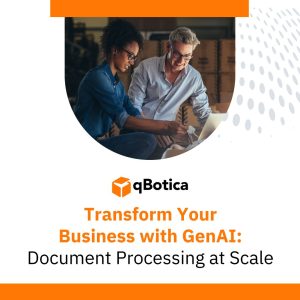In today’s fast-paced business environment, efficient management of documents is critical to maintaining a competitive edge. Document processing plays a pivotal role in transforming how organizations handle, store, and retrieve information.
This blog aims to provide a comprehensive guide to document processing solutions, elucidating their importance, the technologies involved, and their applications across various industries. By the end of this article, readers will have a deep understanding of document processing and how it can revolutionize their business operations.
Understanding Document Processing
Document processing involves the conversion of physical documents and associated forms into a digital format, enabling easier management and retrieval of information.
It encompasses a range of activities from scanning and digitizing paper documents to extracting and organizing data for business use. As companies continue to digitize their operations, the role of document processors becomes increasingly significant.
Document processing services are essential for businesses looking to streamline their operations and improve efficiency. These services help organizations manage large volumes of documents, reduce manual labor, and ensure data accuracy.
What is Document Processing?
So, what is document processing? At its core, it is the method of transforming physical documents into a digitized format, making information easily accessible and manageable in a digital environment.
This process involves several steps, including scanning, data extraction, and storage. The digitized documents can then be used for various purposes, such as legal documentation, financial records, and customer service.
Types of Documents Involved
- Legal documents: Contracts, agreements, court filings
- Forms: Applications, surveys, feedback forms
- Paperwork: Invoices, receipts, bills
- Electronic documents: PDFs, Word files, emails
Document processing services cover all these types, ensuring that businesses can handle any document-related task with ease.
Types of Document Processing Services
There are various document processing services available to cater to the needs of different industries. These services can be broadly categorized into the following:
Legal Document Processing Services
Legal document processing involves handling sensitive and confidential information. It includes activities such as contract management, court filing, and compliance management. Legal document processing services ensure that legal documents are accurately processed, stored, and retrieved when needed.
Form Processing
Form processing is essential for businesses that handle large volumes of forms regularly. This service involves extracting data from forms and organizing it into a structured format. Form processing is commonly used in the healthcare, finance, and customer service sectors.
The Role of Technology in Document Processing
Technological advancements have significantly enhanced the efficiency and accuracy of document processing. Modern document processing tools leverage various technologies to automate and streamline document-related tasks.
Key Technologies in Document Processing
- Optical Character Recognition (OCR): Converts printed or handwritten text into digital data.
- Artificial Intelligence (AI): Enhances data extraction and processing through machine learning algorithms.
- Machine Learning (ML): Enables the system to learn from data and improve its performance over time.
- Natural Language Processing (NLP): Analyzes and understands human language to extract meaningful information.
- Robotic Process Automation (RPA): Automates repetitive tasks, reducing human intervention.
These technologies form the backbone of modern document processing solutions, enabling businesses to handle large volumes of documents quickly and accurately.
How Document Processing Solutions Work
Document processing involves several steps, each designed to ensure the efficient conversion of physical documents into a digital format. Here’s a step-by-step overview of how document processing solutions work:
Pre-processing
Pre-processing involves preparing the document for digitization. This may include tasks such as cropping, noise reduction, and de-skewing to enhance the quality of the document.
Data Classification
In this step, documents are categorized based on their type or structure. This helps in applying the correct data extraction rules, ensuring accuracy in the subsequent steps.
Data Extraction
Using technologies like OCR and ICR (Intelligent Character Recognition), data is extracted from the document. These technologies can recognize both printed and handwritten text, making it possible to process various document types.
Error Detection and Correction
Extracted data is validated for accuracy. Any errors are flagged and corrected through manual review, ensuring the integrity of the data.
Data Storage and Integration
The validated data is stored in a digital format and integrated with other business applications. This allows for seamless access and use of the data across the organization.
Choosing the Right Document Processing Tools
Selecting the right document processing tools is crucial for maximizing efficiency and achieving desired outcomes. Here are some criteria to consider when choosing a document processing solution:
Criteria for Selection
- Accuracy: The tool should have high accuracy in data extraction and error detection.
- Scalability: It should handle large volumes of documents efficiently.
- Integration: The tool should integrate seamlessly with existing business applications.
- Security: It should ensure the security of sensitive and confidential information.
- Ease of Use: The tool should have a user-friendly interface and require minimal training.
Benefits of Document Processing Automation
Automating document processing offers numerous benefits that can significantly impact business operations:
Cost and Time Savings
Automated document processing reduces the time and effort required to handle documents manually. This leads to significant cost savings and allows employees to focus on higher-value tasks.
Improved Data Accuracy and Quality
Manual data entry is prone to errors. Automation ensures high accuracy and quality of data, leading to better decision-making and reduced operational risks.
Enhanced Workflow Efficiency
Document processing tools streamline workflows by automating repetitive tasks. This improves overall efficiency and productivity.
Better Security and Compliance
Document processing solutions store data in secure digital formats, ensuring compliance with regulatory requirements and protecting sensitive information.
Scalability and Flexibility
Automated solutions can scale to handle increasing volumes of documents without compromising performance. They are also flexible enough to process various document types and formats.
Industry-Specific Applications of Document Processing
Document processing solutions find applications across various industries, each with its unique requirements and challenges:
Banking and Financial Services
In the banking sector, document processing is used for handling checks, account opening forms, mortgage applications, and KYC documents. These solutions streamline operations and improve customer satisfaction.
Insurance
Insurance companies use document processing to handle claims forms, policy applications, and other documents. This reduces manual effort and improves the accuracy of claims processing.
Healthcare
Healthcare providers use document processing for patient intake forms, insurance claims, and medical records. This improves the speed and accuracy of data processing, enhancing patient care.
Legal
In the legal industry, document processing is used for managing contracts, deeds, and court filings. This ensures quick and accurate access to legal documents, improving case management.
Government
Government agencies use document processing for handling tax forms, social security documents, and employment applications. This improves efficiency and reduces processing time.
Challenges in Document Processing and How to Overcome Them
While document processing offers numerous benefits, it also presents certain challenges that organizations need to address:
Common Challenges
- Data Quality Issues: Poor quality of scanned documents can lead to errors in data extraction.
- Complex Document Structures: Handling documents with complex structures and formats can be challenging.
- Integration Difficulties: Integrating document processing solutions with existing systems can be complex.
Strategies to Overcome Challenges
- Use Advanced Technologies: Implement advanced technologies like AI and ML to improve data extraction accuracy.
- Invest in High-Quality Scanners: Ensure high-quality scans to reduce errors in data extraction.
- Choose Flexible Solutions: Opt for document processing tools that offer easy integration with existing systems.
Future Trends in Document Processing
The future of document processing is promising, with several emerging trends set to revolutionize the industry:
Artificial Intelligence and Machine Learning
AI and ML will continue to play a crucial role in enhancing document processing capabilities. These technologies will enable more accurate data extraction and real-time processing.
Blockchain for Document Security
Blockchain technology can enhance the security of document processing by providing a tamper-proof record of all document transactions.
Cloud-Based Solutions
Cloud-based document processing solutions offer greater flexibility and scalability, allowing businesses to manage documents from anywhere.
Increased Automation
Robotic Process Automation (RPA) will further automate repetitive tasks, reducing the need for human intervention and improving efficiency.
qBotica: Leading the Way in Document Processing Solutions
qBotica is a leading service provider in the field of intelligent automation solutions. Our advanced document processing tools leverage the latest technologies to provide comprehensive solutions for businesses across various industries.
qBotica’s Intelligent Automation Solutions
- Data Extraction: High-accuracy data extraction using AI and ML technologies.
- Document Classification: Automated classification of documents based on content and structure.
- Data Validation: Ensuring the accuracy and integrity of extracted data.
- Integration: Seamless integration with existing business applications.
- Security: Enhanced security features to protect sensitive information.
Success Stories and Testimonials
Our clients have experienced significant improvements in efficiency, accuracy, and cost savings by implementing qBotica’s document processing solutions. Here are a few testimonials from our satisfied clients:
- “qBotica’s document processing solutions have transformed our operations. We can now process documents faster and with greater accuracy, saving us time and money.” – Financial Services Client
- “The automation of our document processing tasks has reduced errors and improved compliance. qBotica’s tools are a game-changer for our business.” – Insurance Client
- “With qBotica, we have streamlined our document management processes, allowing us to focus on delivering better service to our clients.” – Legal Services Client
Conclusion
Document processing is a critical component of modern business operations. By leveraging advanced technologies and automated solutions, businesses can significantly improve their efficiency, accuracy, and overall productivity.
qBotica is at the forefront of this transformation, offering cutting-edge document processing solutions tailored to meet the unique needs of various industries.
If you’re looking to revolutionize your document processing capabilities, contact qBotica today for a consultation. Our team of experts is ready to help you implement the best solutions to drive your business forward.
For further reading and resources on document processing, explore our website and stay updated with the latest trends and innovations in the field.




